Politics
[OPINION] Uzodinma And Imo Local Governments: The Untold Story


By Collins Opurozor
Some say democracy in Nigeria is fledgling. It is still learning to fly. Others say our democracy is wobbling. It is still learning to walk. Yet, some others insist that the country’s democratic path is troubled. Many thorns and spines are on its way. Everyone seems to agree that the democratic aspirations of the country are yet unfulfilled. To be sure, the local government system is one mechanism put in place to expand the democratic space and spread its values in Nigeria. The stifling of this system in most states of the country, therefore, is one of the ways that democracy has remained an aching mirage in the country.
A big democratic tragedy in Imo state, something almost as big as having an unelected person hold the reins of power in the state, is that the local government system has been emasculated. In practice, the system no longer exists. Chief Hope Uzodinma has commissioned and supervised the decapitation of that very essential tier of government. Imo is a state that has over seventy percent of her entire population resident in the rural areas, yet the only channel through which state power penetrates and delivers common good to the people has been completely ripped apart. The result is simple and glaring. Imo is now divided between a narrow island of affluence occupied by Uzodinma and his band of political waylayers, and a vast sea of affliction where all Imo people occupy. Imo state is now an ungoverned space.
For the last eighteen months that Uzodinma has run, or has pretended to run, the affairs of Imo state, records from the Federation Accounts Allocation Committee (FAAC) show that the local governments in the state ought to have all received their full allocations seventeen times. For clarity, the monthly allocations that accrue to Imo state from FAAC, which include her share of the VAT and 13% Derivation, are totally different from what the local governments in the state also receive. For instance, while Imo state got a total sum of N4.2 billion from FAAC in February 2020, the 27 LGAs in the state supposedly received another N3.89 billion. By September 2020, the figure for the LGAs had risen to N4.08 billion, and by the last allocation, which was in May 2021, the LGAs in Imo were supposed to have received a total of slightly below N68 billion under the watch of Uzodinma. This figure excludes 10% of the state’s IGR which in line with the provision of the law should also be disbursed to the LGAs through the Joint Accounts Allocation Committee (JAAC).
The big questions are: where have these humongous sums gone to? What projects can be found in the local governments to justify these huge allocations? Does a governor have the right to tamper with local government funds? When last did a JAAC meeting hold in Imo state? When you go to Obowo, for instance, which should receive an average of N130 million monthly, what can you find there to justify that over N2.2 billion has come to that locality in the last seventeen months? What can Isiala Mbano show for the N146 million monthly allocations which it should receive? What has been done differently in Mbaitoli to prove that every month N178 million goes there and that in the last seventeen months over N3 billion has been utilized in making life better in that area? These are questions that Uzodinma should urgently answer.
It is instructive to note in the recent past when Rt. Hon. Emeka Ihedioha was in office, all the local governments in Imo state had unfettered financial autonomy. To ensure that project funding guidelines were strictly adhered to, there was an LGA Project Monitoring Bureau. It was for that reason that the local governments under Gov Ihedioha within six months built twenty-seven ultramodern secretariats and provided the fulcrum for the incubation and development of sports through the construction of twenty-seven recreation centers across the state. The implication was that local talents in sports would be harnessed, and the energies of the young people channeled away from crime, since the opportunities in sports had been opened up to them. This was an effective soft security initiative. We also saw the local governments purchase earthmoving and construction equipment. Governance was returned to the people.
The reality in Imo now is that even the local government workers are not paid their salaries. A recent memo by the Accountant General of Imo state to the Chairmen of the Interim Management Committees of the LGAs was requesting them to come forward with the lists of unpaid local government workers in the past one year. This is an aberration. Workers owed for a year? State Accountant General requesting to pay workers in another tier of government? This simply implies that allocations to the LGAs, which they can use to meet their first-line obligation of payment of salaries, never actually get to them.
Imo people must rise up and begin to ask this regime of Uzodinma some relevant questions about the whereabouts of the local government funds. Life in Imo has become a misery, and most rural areas have been totally cut off from their neighbours because of lack of access roads. The restiveness being witnessed today is in part the fallout of a system recently created in Imo which has shut the youths completely out of democratic dividends and has made despondency, even despair, to reign supreme. The N2.7 billion which Ideato North alone is supposed to have received under Uzodinma is enough to rev up infrastructure in that area, restore electricity and revive the many moribund industries dotting their landscape. But what you now find in Ideato North is a situation where Akokwa people have taken it upon themselves to levy themselves to raise about N44 million in order to restore electricity to their area. This is pathetic and painful, and it makes it more urgent for Uzodinma to tell Imo people where the allocations meant for the LGAs are kept!
Imo shall rise again!
Politics
“Fuel Subsidy Removal Was A Necessary Action To Prevent Nigeria From Going Bankrupt” – President Tinubu


President Bola Ahmed Tinubu has said that fuel subsidy was removed to save Nigeria from going bankrupt.
In as much as the hardship in the country has taken a toll on both the rich and the poor, Especially the poor, President Tinubu has justification for the decision he took on fuel subsidy removal.
Speaking as one of the panelists at the ongoing World Economic Forum in Riyadh, Saudi Arabia on Sunday, April 28, Tinubu said he was convinced it was in the best interest of the people.
He said;
“For Nigeria, we are immensely consistent with belief that the economic collaboration and inclusiveness are necessary to engender stability in the rest of the world.
“Concerning the question of the subsidy removal, there is no doubt that it was a necessary action for my country not to go bankrupt, to reset the economy and pathway to growth.
“It is going to be difficult, but the hallmark of leadership is taking difficult decisions at the time it ought to be taken decisively. That was necessary for the country.
“Yes, there will be blowback, there is expectation that the difficulty in it will be felt by greater number of the people, but once I believe it is their interest that is the focus of the government, it is easier to manage and explain the difficulties.
“Along the line, there is a parallel arrangement to really cushion the effect of the subsidy removal on the vulnerable population of the country. We share the pain across board, we cannot but include those who are vulnerable.
“Luckily, we have a very vibrant youthful population interested in discoveries by themselves and they are highly ready for technology, good education committed to growth.
“We are able to manage that and partition the economic drawback and the fallout of subsidy removal.”
As a Nigerian citizen, what do you think about the Government’s decision to avert bankruptcy by removing fuel subsidy?
Politics
Enugu State Government Flag Off Palliative Distribution In The State


The Governor Of Enugu State, Peter Mbah has pioneered the distribution of food to the people of the state who are in dire need. He said this is in collaboration with the Federal Government to reduce the economic hardship in the country.
Via his social media platform, He wrote;
“Earlier today, we flagged off another round of palliative distribution in our state.
This is a collaborative effort between our administration and the federal government to cushion the effects of the economic hardship in the country.
I have directed the committee in charge of the palliative distribution to ensure that the items get to those in dire need of them.”
Here are pictures from the palliative distribution flag off.










Politics
Governor Of Delta State, Sheriff Oborevwori Visits Fled Community Of Okuama, Calls Indigenes To Return Home


Delta State Governor, Sheriff Oborevwori has visited Okuama with an assurance for the safe return of the indigenes who fled the community in the wake of the crisis that ensued in the month of March.
The Governor who was accompanied by some government officials, reiterated that innocent citizens would not be made to suffer for what they know nothing about.


Recall that seventeen officers and soldiers of the Nigerian Army were killed in Okuama community on the 14th of March, 2024, a development which made the people of the community to flee for fear of being attacked.
Recall we once reported how the stranded people of Okuama have been hiding and dwelling in the forest after the attack carried out the Nigerian soldiers who came for a peace call.
The Governor has now assured Indigenes to return as the community is safe for them.
The visit of the governor is coming one month after the killing of the military personnel.
-

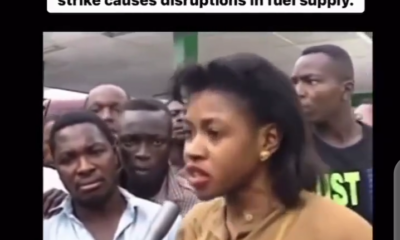

 News5 days ago
News5 days agoNigerians Seek Woman Who Spoke Out Eloquently Against Fuel Scarcity In Viral 1994 TV Clip
-

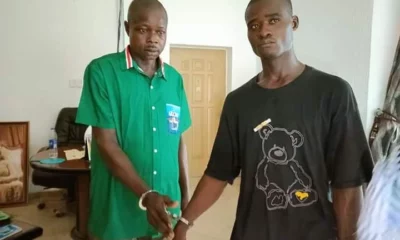

 News4 days ago
News4 days agoAnambra State Government Arrests Man For Marrying Off His Underage Daughter
-

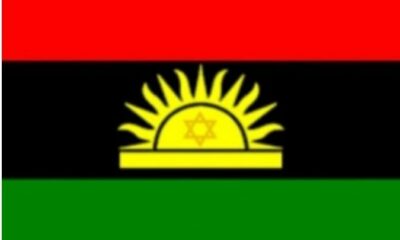

 News4 days ago
News4 days agoIPOB Declares May 30th As Sit-at-home Day Across The Southern East States To Honour Biafran Fallen Heroes
-

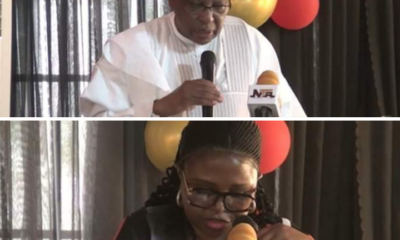

 Education3 days ago
Education3 days agoFederal Government Sets To Commence School-To-Work Scheme
-



 News2 days ago
News2 days agoLady Dies After Friends Pushed Her Into Boiling Pot Of Fresh Pepper In Delta State
-

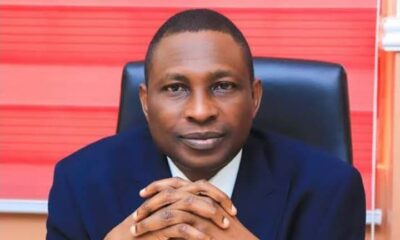

 Finance2 days ago
Finance2 days agoEFCC Chairman Tasks Nigerian Youths Against Crimes And Fraudulent Acts






